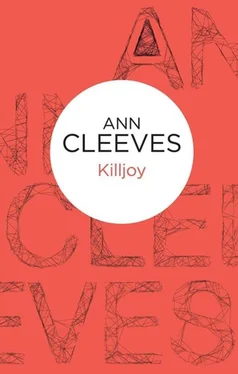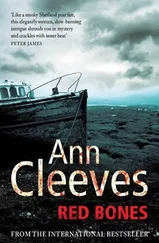Ann Cleeves - Killjoy
Здесь есть возможность читать онлайн «Ann Cleeves - Killjoy» весь текст электронной книги совершенно бесплатно (целиком полную версию без сокращений). В некоторых случаях можно слушать аудио, скачать через торрент в формате fb2 и присутствует краткое содержание. Жанр: Детектив, на английском языке. Описание произведения, (предисловие) а так же отзывы посетителей доступны на портале библиотеки ЛибКат.
- Название:Killjoy
- Автор:
- Жанр:
- Год:неизвестен
- ISBN:нет данных
- Рейтинг книги:5 / 5. Голосов: 1
-
Избранное:Добавить в избранное
- Отзывы:
-
Ваша оценка:
- 100
- 1
- 2
- 3
- 4
- 5
Killjoy: краткое содержание, описание и аннотация
Предлагаем к чтению аннотацию, описание, краткое содержание или предисловие (зависит от того, что написал сам автор книги «Killjoy»). Если вы не нашли необходимую информацию о книге — напишите в комментариях, мы постараемся отыскать её.
Killjoy — читать онлайн бесплатно полную книгу (весь текст) целиком
Ниже представлен текст книги, разбитый по страницам. Система сохранения места последней прочитанной страницы, позволяет с удобством читать онлайн бесплатно книгу «Killjoy», без необходимости каждый раз заново искать на чём Вы остановились. Поставьте закладку, и сможете в любой момент перейти на страницу, на которой закончили чтение.
Интервал:
Закладка:
He phoned the Woods’ home in Martin’s Dene but there was no reply so he dialled Dennis Wood’s business number. A breathy young receptionist said: ‘How may I help you?’ and ‘Please hold,’ then a computer played a tuneless jingle in his ear as he waited. The synthesized music irritated him so intensely that he was about to replace the receiver when Wood’s voice came on quite suddenly.
‘Inspector,’ he said. ‘ What can I do for you?’
‘I’m interested in any records Mrs Wood might have kept on the Grace Darling Centre. Presumably she had minutes of trustees’ meetings, copies of accounts, that sort of thing. Where would I find them?’
‘In her office at home. She had a filing system which would put any business to shame. Look, I’m not expecting to be home until later but you’ve still got a key. Why don’t you help yourself?’
So in the late afternoon Ramsay drove to Martin’s Dene. He slowed down in the village past the Georgian terrace inhabited mostly now by university lecturers from Newcastle and past the Holly Tree restaurant where two businessmen were emerging from a late lunch. St Martin’s Close was quiet. The big houses were set well back from the trees. He thought it was not surprising that none of the residents had seen a strange car in the street on the evening of Amelia’s death.
He let himself into the house and switched off the alarm. The dog, apparently shut up in the kitchen, began to bark but again the houses were too far apart for any neighbours to hear and worry about intruders. Eventually the animal lapsed into an exhausted silence. The study was a pleasant square room at the side of the house. Along one wall was a set of filing cabinets and it seemed that, as Wood had said, Amelia’s record keeping had been meticulous. A three-drawer cabinet was given over entirely to the affairs of the Grace Darling Centre and Ramsay began at the top and worked his way carefully through the envelope files contained there.
Copies of the minutes of trustees’ meetings went back to the opening of the Centre. Amelia, apparently, had been on the steering committee which lobbied for its formation and began the unending business of fund-raising. In none of the meetings, however, had there been any discussion about Lynch in relation to financial matters. If Amelia had any suspicions about his integrity she had kept them to herself. Next came a bundle of copy letters sent out to local businesses asking for sponsorship of the Arts Centre. It seemed that Amelia had experimented with the format of the letter and had made a note of the different levels of response to each one. Ramsay wondered how many other local charities would be equally efficient and if Lynch had been aware of the degree of detailed interest that Amelia had taken in the finances of the scheme.
About three years previously the borough council had cut its grant to the Centre. The council had been threatened with poll-tax capping and the Community Arts fund had been chopped in half. Amelia had been put in charge of a special fund-raising exercise for the Grace Darling, an attempt to replace the missing grant. She had kept a list of the sponsorship she had achieved during that time. The sums were substantial and had totalled more than fifty thousand pounds. Amelia had been a persuasive woman.
Pinned to the back of the word-processed list of sponsors was a bank statement covering the period of fund-raising. Amelia had ticked off each entry as it appeared on the statement but it seemed that one of the sponsors had failed to meet its commitment to the Centre, or at least that its cheque had not been paid into the bank. A company called Northumbria Computing had pledged ten thousand pounds over two years but there was no record of the amount on the bank statement. Amelia had obviously seen the omission because beside the company’s name on the list was a large question mark.
Ramsay allowed himself a moment’s self-congratulation. He must be right. The theory devised in his office was almost proved. He was convinced that a fraud had taken place.
Then he began to wonder how it had been done. Surely Northumbria Computing would have made its cheque payable to the Grace Darling Centre, not to Gus Lynch personally. How then had he managed to get his hands on the money? And if Amelia Wood had realized that he had stolen from the trust, why hadn’t she taken steps to bring the matter to light? If she had taken her suspicions to an auditor he would discover immediately what had happened to the money. Ramsay could understand that a charity like the Grace Darling would want to avoid damaging publicity but there were ways to deal with the thing discreetly. He had seen it done before.
When Prue Bennett left her office at six o’clock she came across Ramsay in the lobby, leaning on Joe Fenwick’s desk, chatting to the porter as if they were old friends. It was clear that he was waiting for her, and she did not know what to make of it. She had persuaded herself that she rather despised him. There was something grubby and unpleasant about his prying into other people’s business. Yet now she found his presence reassuring.
‘I’m glad to have bumped into you,’ he said, as if the meeting had been quite by chance. ‘ There are one or two questions I need to clear up.’
‘I can’t stop now,’ Prue said. ‘Anna will be expecting me. We’ve hardly seen each other in the last few days.’
‘Perhaps I could come back with you,’ he said, ‘if it wouldn’t be too much of an intrusion.’
She would have liked to assert her authority, to tell him to get lost, but she couldn’t quite manage it. She was curious and it was hard to see him now as the sleazy detective she had long imagined. Most of her friends were younger, people she’d met through the theatre. They were enthusiastic, passionate, changing their philosophies to suit the latest trend. They were fun. Ramsay’s solidness and constancy was different and attractive.
‘No,’ she said. ‘It wouldn’t be an intrusion.’
She wondered if she should invite him for a meal then thought that might cause him embarrassment. Perhaps there was some rule preventing policemen eating with the murder suspects. There should be.
He followed her up the dual-carriageway to Otterbridge in his own car. She saw his headlights in her mirror and though she usually drove home far too fast she maintained the regulation 60 m.p.h. Is this what it would be like? she thought. Living with a policeman? Having to keep all the rules. Could I stand it?
In the house the lights were on and as usual she called up the stairs to Anna. Ramsay followed her through to the kitchen where she automatically switched on the kettle then took a tin from the fridge to feed the cat. Anna wandered in ten minutes later, poured herself a mug of tea and went away without a word.
‘I’m sorry,’ Ramsay said. ‘You wanted some time together.’
‘That’s all right,’ Prue said. ‘ She’s not communicating much anyway. I think she’s in love.’
‘Who’s the subject of her affection?’
‘John Powell. He took her out last night.’ She smiled, making a joke of her unease. ‘You policemen can’t be badly paid,’ she said. ‘He brought her home in a very smart new Polo. His mother’s apparently. My car’s fifteen years old and held together with string.’
‘It’s about money that I want to talk to you,’ he said.
He had intended to stick to a story that his enquiries into the Grace Darling finances were a matter of routine police work, but she was too intelligent to believe that. Even after all these years she knew him too well. He saw that the only way to obtain her co-operation was to tell her the truth.
‘I think Gus Lynch might have been stealing from the Arts Centre,’ he said. ‘ Had you ever suspected anything like that?’
Читать дальшеИнтервал:
Закладка:
Похожие книги на «Killjoy»
Представляем Вашему вниманию похожие книги на «Killjoy» списком для выбора. Мы отобрали схожую по названию и смыслу литературу в надежде предоставить читателям больше вариантов отыскать новые, интересные, ещё непрочитанные произведения.
Обсуждение, отзывы о книге «Killjoy» и просто собственные мнения читателей. Оставьте ваши комментарии, напишите, что Вы думаете о произведении, его смысле или главных героях. Укажите что конкретно понравилось, а что нет, и почему Вы так считаете.












